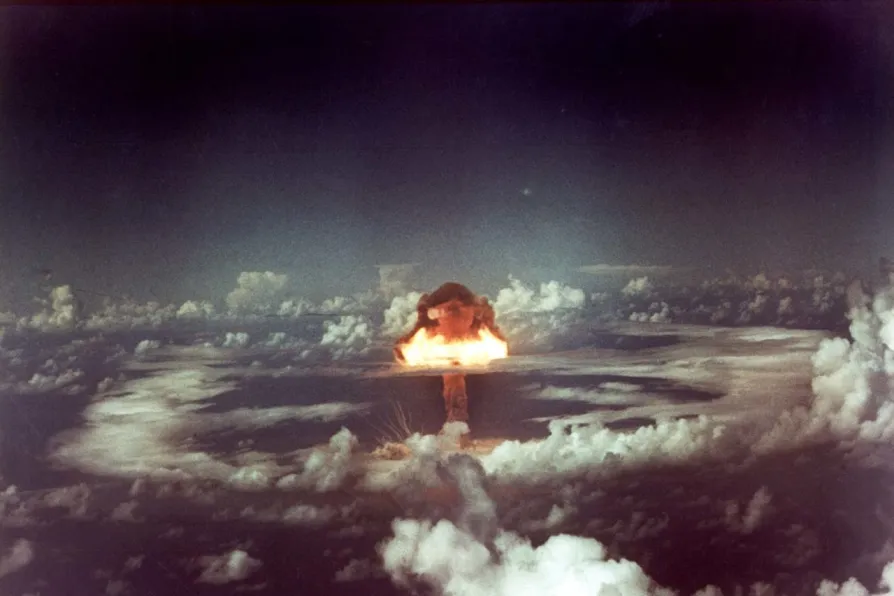As the RMT Health and Safety Conference takes place, the union is calling for urgent action on crisis of work-related stress, understaffing and the growing threat of workplace assaults. RMT leader EDDIE DEMPSEY explains
CND’s Stop the Nuclear Nightmare conference in Glasgow will be an important step towards destroying the false arguments that weapons and war spending will lead to job creation and prosperity, rather than bringing Armageddon closer, writes SIMON BARROW

 A mushroom cloud from a nuclear bomb explosion
A mushroom cloud from a nuclear bomb explosion
IN a month’s time, trade unionists, environmentalists, community organisations and political activists will gather in Glasgow to push back firmly against the British government’s drive towards rearmament and further investment in Britain’s dangerous and wasteful nuclear weapons programme.
The gathering, organised by Scottish CND, will bring together campaigners from across these islands. But the particular spectre of Trident submarines located just a few miles down the road at Faslane will not be lost on anyone attending in person or online.
Bluntly entitled Stop the Nuclear Nightmare, the aim of this timely event in the heart of Scotland’s largest city — a former shipbuilding and heavy industry powerhouse — is to make the direct connection between the threat nuclear weapons pose in an increasingly unstable world and the vast misdirection of economic resources they represent.
As large arms companies savour the prospect of many more billions being poured into military production across Europe, and as the Labour government powers ahead with an unstable, unreliable and unnecessary Trident replacement programme, the choices facing us become abundantly clear.
Will the AI-driven technological revolution of the coming decades lead to an unprecedented era of opportunity and possibility for the great majority, or will our needs and future be sacrificed to the remorseless drive for accumulation by a heavily armed few?
A major focus of Scottish CND’s mobilising conference will therefore be on the back-to-front economics of nuclear-fronted militarism, and the huge potential benefits in terms of jobs, prosperity and environment which a genuinely “just transition” way from both nuclear and fossil fuel dependence could represent.
At the centre of this debate is the political challenge of reframing the discourse about defence towards the concrete issues of human need and security arising from a continuing cost-of-living crisis and the political fragmentation which a lack of a clear vision around this worsens.
The spin from Prime Minister Keir Starmer and his defence secretary John Healey is that a massive expansion of military industry and capability is necessary to ensure Britain’s security and to guarantee jobs and prosperity for its people. Neither of these assertions is true.
As far as security goes, the reality is that the drive to rearmament will increase insecurity and deepen potential conflict, likely leading to a new and perilous wave of nuclear proliferation. But the grim lesson of modern history is that almost all arms races lead to war.
Nor is this expansion necessary. Britain’s military spending was among the highest in the world, well before the latest hike was proposed, and in real terms exceeded spending on defence at the height of the cold war in 1980.
Yet this Labour government has committed to vast increases in the arms bill, from 2.3 per cent of GDP currently (£66.3 billion) to 2.5 per cent by 2027/2028 (£80.5bn) and 3.5 per cent (£121.2bn based on the 2029/30 GDP forecast) by 2035.
Unsurprisingly, it is transnational arms companies themselves who are lobbying hard for all this. They smell profits and the chance to retool in a way which will create neither sustainable jobs nor socially beneficial production.
The promise of “military Keynesianism” (a big boost to civilian benefit from military investment) is a false one. A people’s economy is effectively being sacrificed for a bosses’ bomb.
That picture is reinforced by research coming from an unlikely source, the leading military think tank the Royal United Services Institute (RUSI).
“Framing defence spending as a path to prosperity ignores its poor economic returns, limited job creation, and the opportunity costs of not making alternative public investments,” argue Noah Sylvia and Khem Rogaly in their recent RUSI paper, The False Promise of Defence as Prosperity.
They continue: “Starmer’s government claims that the defence sector will become an ‘engine for growth,’ a route to ‘prosperity’ and a source of security for working people. These arguments are now lynchpins of the government’s narrative as it fails to deal with stagnation and real incomes are squeezed.”
Sylvia and Rogaly then proceed systematically to dismantle such claims, citing sobering arguments and data from the European Commission, the Rand Corporation and other eminently Establishment sources.
Trade unions are among those who are waking up fast to the spectre of a dangerous and damaging future unless we make the link between economic security and a major shift away from the old technologies of human and climate destruction.
Others are yet to be convinced. There is understandable concern about the future of jobs and livelihoods currently tied to the arms sector and nuclear weapons.
But unless we start to build pressure now, to counteract the new military-industrial complex rhetoric, we will find ourselves with fewer and fewer genuine choices.
The Stop the Nuclear Nightmare conference in Glasgow is a major opportunity to articulate a different vision, to mobilise for change, and to organise for a better and safer future.
Simon Barrow is a writer, trade union activist and consultant to Scottish CND on the Stop the Nuclear Nightmare conference at Adelaide Place, Glasgow, from 10am to 4:30pm on Saturday November 1. Full details at www.banthebomb.org.










